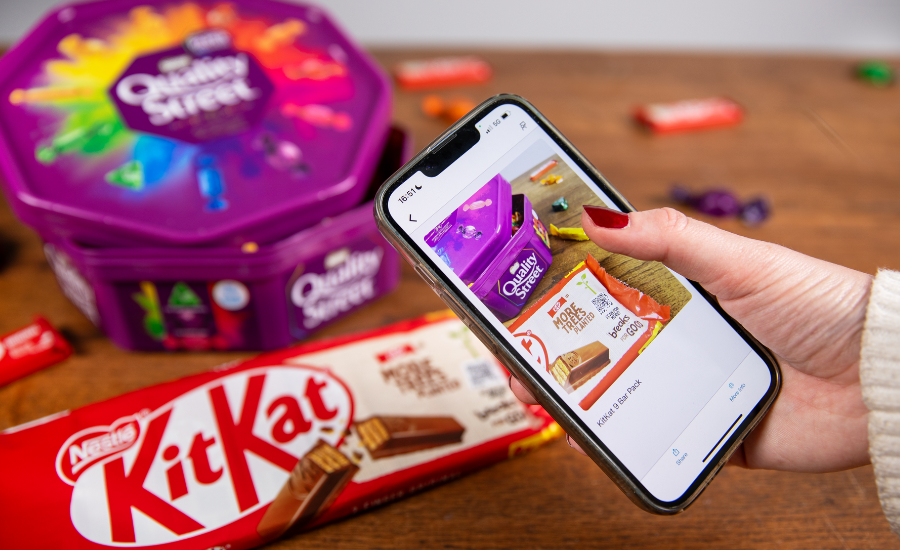
Cadbury’s core sharing bars are now being packaged in recycled plastic. Image courtesy of Mondelēz International
Confectionery Packaging Seeing Improvements in Several Key Areas
In recent years, the confectionery market has proven to be a reliable canvas for packaging developers looking to test out innovative solutions. With the size of the global confectionery market projected to hit over $250 billion by 2033 (per Spherical Insights LLP), and with companies constantly looking to make new impressions on their customers, there is ample opportunity for confectionery packaging to make strides in accessibility, sustainability and versatility.
As an example, Nestlé recently trialed accessible QR codes for its KitKat and Quality Street brands, allowing visually impaired shoppers to gain product information with greater ease.
On the sustainability front, Amcor helped Mondelēz develop packaging made from recycled materials for its Cadbury core sharing bars. The new wrappers are being sold in the UK and Ireland.
Finally, Cox & Co developed new flow wrap packaging for chocolate bars. The new packaging is plastic-free and much easier to recycle.
Learn more about these innovations in confectionery packaging below.
Nestlé Confectionery Trials Accessible QR Codes for KitKat and Quality Street

The new packaging allows blind and partially sighted people to easily gain product information. Courtesy of Nestlé
Nestlé Confectionery is trialing accessible QR codes on two of its beloved brands, KitKat and Quality Street, to help shoppers who are living with sight loss access product information more easily.
The new QR codes are out now on KitKat two finger multipacks, while Quality Street will also host the accessible codes across its permanent range.
In the UK alone, more than two million people are living with sight loss, and around 340,000 of these people are registered as blind or partially sighted.
The innovative QR codes, powered by Zappar technology, allow blind and partially sighted shoppers to easily retrieve essential product information.
Shoppers will be able to scan the accessible QR codes on their phones using existing apps already used by the blind and partially sighted community, meaning there is no need for additional downloads.
Mondelēz Partners with Amcor to Use Recycled Packaging for Cadbury Sharing Bars

The new wrappers are made from 80% certified recycled plastic. Courtesy of Mondelēz International
Mondelēz International announced that its Cadbury core sharing bars, manufactured in Bournville and Coolock and sold in the UK and Ireland, will be wrapped in 80% certified recycled plastic packaging, which can be attributed to plastic sourced from advanced recycling technology.
This move is the result of a collaboration with Amcor, a global leader in developing and producing more sustainable packaging solutions, and Jindal Films, an industry leader in the development and manufacture of recyclable films designed for flexible packaging.
Starting from 2025, in a phased approach, the project aims to cover approximately 300 million sharing bars across the UK&I Cadbury core tablet portfolio. The move will see the highest percentage of recycled flexible plastic used within the Cadbury brand globally. As part of this effort, 80% of the plastic used in the packaging can be attributed to recycled plastic through mass balance and ISCC (International Sustainability and Carbon Certification) PLUS certification.
Cox & Co Develops Flow Wrap Chocolate Paper Packaging

The paper packaging is the result of an extensive 18-month process. Courtesy of Cox & Co.
For 18 months, Cox & Co has been working toward producing a paper flow wrap to replace its compostable plastic packaging. Working closely with a paper manufacturer in Sweden to find the right type of material and reconfiguring its flow wrap machine to accept it, last April saw the first 100% paper flow wrapped chocolate bar roll off the production line.
Offering a 12-month minimum shelf life, Cox & Co’s innovative new paper flow wrap solution is a huge step in the right direction to reducing the huge amount of chocolate packaging waste that currently ends up in landfill.
“Consumers are now actively seeking brands that take sustainability seriously and products that are easy to recycle,” explains Gavin Cox, founder of Cox & Co. “Chocolate is a popular household purchase and yet so little of the packaging can be easily recycled at curbside. We are set to change all that with our revolutionary new packaging, which offers a neat and tidy result without the use of plastic.”
As a smaller brand, Cox & Co has been able to pivot its production to test out new paper-based packaging solutions. “It’s taken many months of trial to get to this point, but it’s been worth the effort. Seeing that first bar roll off the production line was incredibly satisfying,” Cox adds.
